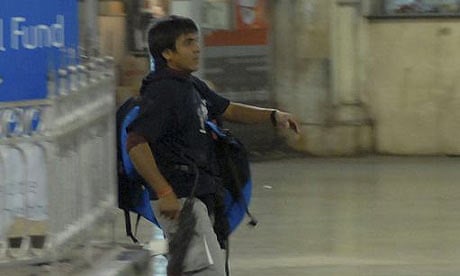The lone surviving gunman of the Mumbai terrorist attacks today stunned a courtroom by changing his plea to guilty and giving a blow-by-blow account of his part in the siege in which 166 people were killed, in November last year.
Mohammad Ajmal Amir Kasab took everyone by surprise — including his own lawyer — when he told the judge, in Urdu: "Sir, I plead guilty to my crime."
Denying that pressure had been put on him to confess, the teenager described how the 10 gunmen travelled to India by boat from Pakistan and how he and a colleague threw hand grenades and opened fire on members of the public at Mumbai's main railway station.
His confession came two days after the government of Pakistan filed charges against five people it claims masterminded the attacks and identified Kasab as a Pakistani national. In a dossier handed to India, it blamed the attacks on the Laskhar-e-Taiba terrorist group under the direction of its operations chief, Zaki-ur-Rehman Lakhvi.
In court Kasab said he had decided to change his plea because of the change of heart by the government in Islamabad. But his volte face was greeted with scepticism both in India and Pakistan.
Ujwal Nikam, the special public prosecutor in the Mumbai court, suggested that Kasab may be trying to secure a lighter sentence and that he was covering up the involvement of others. He said the prosecution was examining what parts of the plot Kasab might have suppressed.
Chaudhary Mukhtar, Pakistan's defence minister, claimed the confession did not amount to evidence and said Islamabad would not act on the word of one man. "The statements are one-sided and they were made by a person who is under the custody of Indian jail authorities. If he has stood up and given this statement I don't know what pressure he was under," he said.
Kasab's own lawyer, Abbas Kazam, said his client had given no advance warning of his decision to change his plea.
Kasab's detailed confession included the first suggestion of Indian involvement. He claimed that the terrorists had been coached in Hindi by an Indian national, who he named as Abu Jundal.
With the other nine gunmen dead, it was the first opportunity to hear in public from one of those who carried out the attacks.
He claimed that he was recruited after quitting his job as a shop assistant in Jhelum town, in Pakistan, because the wages were too low. He and a colleague, named Muzzafar, travelled to Rawalpindi intending to become robbers.
He said they approached some men with long beards at a festival in the city, guessing that they were Islamic radicals who could supply weapons, and the men put them in touch with Lashkar-e-Taiba. He said they received weapons training from the group.
Kasab claimed he lived in a house in Karachi with 10 other men for a month and a half before the attacks. They were then moved to another address before leaving Pakistan by boat.
On the boat, he said, they met their four handlers, one of them the Indian national, and received their instructions.
He said four different boats were involved in the voyage before they landed in the Colaba area of Mumbai in an inflatable dingy on the evening of 26 November. Once on dry land, they hailed taxis and headed for their targets. He and another gunman, Abu Ismail, made for the Chhatrapati Shivaji terminus.
In the railway station they went into a public toilet to attach a timer to a bomb, he said, then they launched their attack.
"I was firing and Abu was hurling hand grenades. I was in front of Abu who had taken such a position that no one could see him. I fired at a policeman after which there was no firing from the police's side," he said.
They escaped on foot and headed for the Cama hospital and Kasab gave details of the encounter in which three senior anti-terrorist officers were shot dead.
The two terrorists then jumped over the wall of the hospital and he said his colleague told him to wait. "After sometime Abu came back and asked me to come inside. Inside near the gate there was a dead body," he said.
They were finally arrested by police who had set up a road block. The attacks ended when troops stormed the Taj Mahal hotel, where the remaining gunmen were holding out.
The trial continues.
